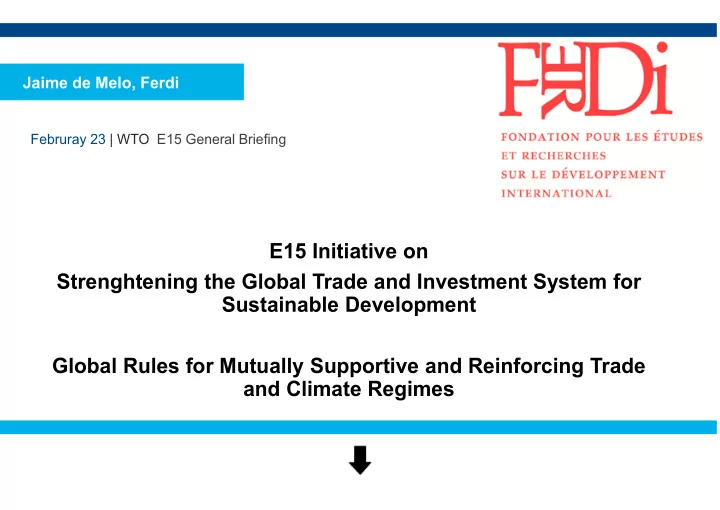

Jaime de Melo, Ferdi Februray 23 | WTO E15 General Briefing E15 Initiative on Strenghtening the Global Trade and Investment System for Sustainable Development Global Rules for Mutually Supportive and Reinforcing Trade and Climate Regimes
Establish Communication between Climate (UNFCC) and Trade (WTO) Regimes • Address legal overlap between climate and trade regime. Develop/implement MRV (Monitoring, reporting, verification) to check on progress in implementing NDCs (nationally determined contributions submitted at COP21). • Require that WTO agree to be bound by judgments in any climate dispute settlement mechanism (DSM) ----DSM for climate compliance to be established). • Put a “Peace clause” (say 3 years) for climate action. WTO members would be requested to wait before challenging national climate measures (say wait to challenge a Border tax adjustment measure)
Recognize implications of embedded carbon in trade • Average leakage rate ≈12%: Border carbon adjustment for energy-intensive trade-exposed sectors (aluminium, steel, cement,…) cuts leakage rate by 1/3. • WTO, UNFCC : establish an agreed common international standard for calculating the amount of carbon in making traded products • Outdated classifications for Goods and Services. Reform HS system at WCO to better distinguish GEM and EPPs; Reform classification of ESs (only 4/155 Service subsectors classified as ESs). • Re-establish distinction ‘good’ - ‘ bad ’ subsidies; Re-instate green subsidies. • Compulsory monitoring of fossil fuel subsidies (equivalent to current TPRM)
Shift WTO from a negative to a positive contract • Currently WTO members can choose environmental policies they wish (except for green subsidies and diluting exchange of market access to partners). • Obligation to address environmental damage. Establishment of likeness should be a question of policy, not of market-likeness as perceived by consumers • Ensure that WTO rules apply to international emissions trading schemes and that «free allowances» are actionable subsidies under WTO rules. • Legalize environmental labelling via recourse to ISO standards (now outcome uncertain under case law). Using an ISO std. Guarantees immunization from challenges at WTO.
Climate Clubs & Sectoral approaches as building blocs • Move from country-based plurilaterals (i.e. FTAs where environment provisions are weak) to issue-based plurilaterals to liberalize environment- friendly trade (as under current EGA) and to address free-riding. • Change WTO law. Then a carbon club for say OECD members could allow members to raise tariffs on shirkers by punishing free riders with an across- the-board tariff on imports. [This has been shown to be an incentive- compatible punishment (most other punishments in MEAs are not)] . • Sectoral deals (take cue from Montreal Protocol and MARPOL). Rely on sectoral deals [maritime (e.g. IMO to set limits on CO2 emissions), arctic deal to address black carbon, aviation (e.g. ICAO to set emission limits or taxes].
Recommend
More recommend